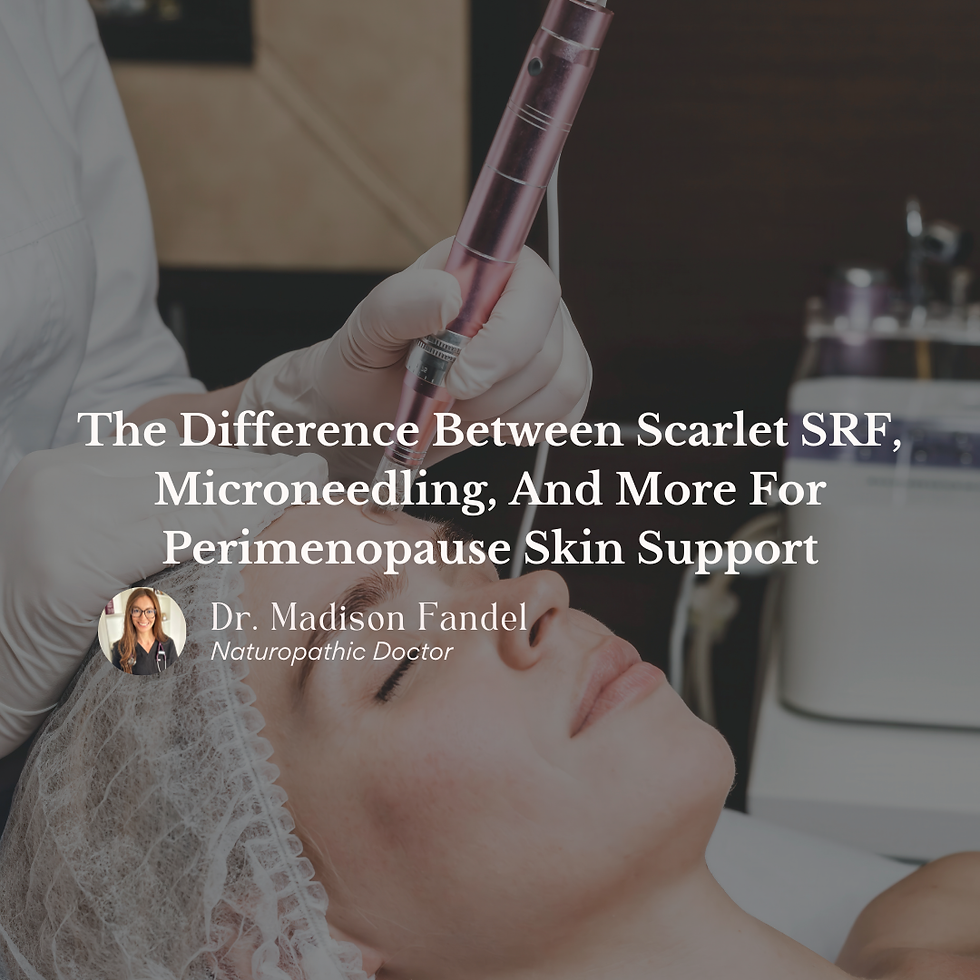Why Collagen Is Essential for Optimal Health: And Natural Ways to Boost Collagen
- Madison Fandel
- Nov 10, 2025
- 3 min read
By: Dr. Madison Fandel, ND, MSCP | Menopause Practitioner
Follow me on socials @drmadisonfandel

You’ve probably heard doctors and wellness experts talk about collagen, and you might even know it’s an important part of the body, but do you really know what collagen is or why it’s so vital for your health?
Today, we're taking a deeper look at this powerful protein and explore how to naturally support your body’s collagen production.
Let's get into it!
Disclaimer:
This content is for informational and educational purposes only and is not intended to be a substitute for professional medical advice, diagnosis, or treatment. Always seek the advice of your physician, naturopathic doctor, or other qualified healthcare provider with any questions you may have regarding a medical condition or health concern. Never disregard professional medical advice or delay seeking it because of something you have read here.
What Exactly Is Collagen?
Collagen is the most abundant protein in the human body. It’s composed of amino acids—mainly glycine, proline, hydroxyproline, and arginine—and acts as the structural foundation for your skin, joints, bones, muscles, and connective tissue.
There are several types of collagen, but the four most common are:
Type I: Provides structure to the skin, bones, tendons, connective tissue, and teeth.
Type II: Found in elastic cartilage, helping to cushion joints.
Type III: Supports the structure of muscles, organs, and arteries.
Type IV: Found within the layers of the skin.
In short, collagen is quite literally the glue that holds everything together.
Why Collagen Matters So Much
Collagen makes up about 30% of all protein in the body and as much as 70% of the skin’s structure. It’s essential for:
Skin elasticity and strength
Joint flexibility and cushioning
Healthy ligaments, tendons, and bones
Muscle tone and organ support
When collagen levels decline, signs of aging—such as wrinkles, sagging skin, joint stiffness, and slower recovery—begin to appear. In other words, most of your body’s strength and resilience depend on collagen.
What Causes Collagen Loss?
Unfortunately, collagen production naturally declines with age—starting in our 20s and 30s—by about 1–2% per year. Several lifestyle and environmental factors can accelerate this process, including:
Excess sun exposure
Smoking
Chronic stress
Poor sleep
Alcohol consumption
Dehydration
Poor nutrition
Supporting collagen production means slowing the aging process from the inside out—protecting your skin, joints, and connective tissue by making healthy lifestyle choices.
Simple And Natural Ways to Boost Collagen
1. Protect Your Skin and Body
Wear sunscreen and a wide-brimmed hat in the sun.
Avoid smoking and limit alcohol intake.
Prioritize quality sleep and stress reduction through yoga, meditation, deep breathing, or spending time in nature.
2. Stay Hydrated
Hydration is key to maintaining collagen integrity. Drink plenty of water and eat hydrating foods such as:
Cucumbers
Bell peppers
Celery
Berries
Avoid too many dehydrating foods and drinks like soda, alcohol, high-sugar items, and processed snacks.
3. Eat a Whole Foods Diet
Focus on nutrient-dense foods that supply collagen and the vitamins and minerals needed for its synthesis.
Vitamin C: Found in kale, broccoli, parsley, rosehips, and thyme.
Zinc: Present in pumpkin seeds, mushrooms, nuts, and garlic.
Copper: Found in organ meats, oysters, and seeds.
Protein: Necessary to provide amino acids for collagen formation.
Bone broth: A particularly good natural source of collagen.
Supplements to Support Collagen Production
Some of the key nutrients that can support collagen production include:
Vitamin C: Essential for collagen synthesis.
Zinc & Copper: Help activate enzymes involved in collagen formation.
Vitamin D3: Supports bone and connective tissue health.
In-Office Collagen Restoration Treatments
As a naturopathic doctor, I offer several therapies that can help stimulate your body’s natural collagen production for healthier skin, joints, and connective tissue:
Nutrient IV Therapy: Delivers collagen-boosting nutrients and antioxidants directly into your bloodstream.
Microneedling with Radiofrequency: Goes a step beyond regular microneedling by using gentle heat energy to tighten the skin and stimulate deeper collagen and elastin production. It helps improve skin texture, firmness, fine lines, and mild sagging.
PRP with Microneedling: Combines platelet-rich plasma with microneedling for powerful, natural skin rejuvenation.
Regenerative Injections: Support collagen growth in joints and soft tissue for improved strength and flexibility.
The Takeaway: Protect Your Collagen, Protect Your Health
Collagen isn’t just about youthful-looking skin, it’s about maintaining the strength, flexibility, and vitality that allow you to live pain-free and age gracefully. And finding natural ways to boost collagen are not as difficult as some make it to seem. It really is all about habit building.
If you’re ready to restore your collagen naturally and enhance your overall well-being, I’d love to help guide you on your wellness journey.
Schedule your appointment online today using the button below.
Your tomorrow starts today.

Follow me on socials @drmadisonfandel


